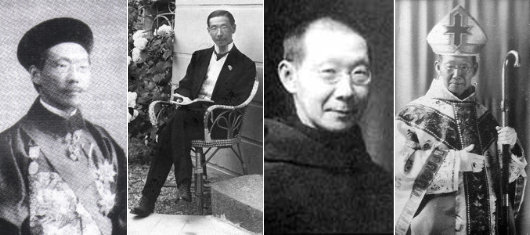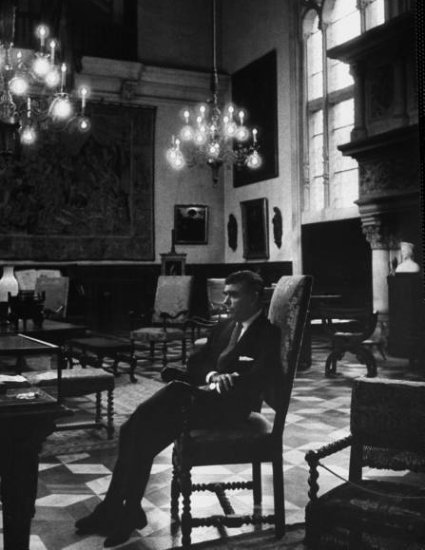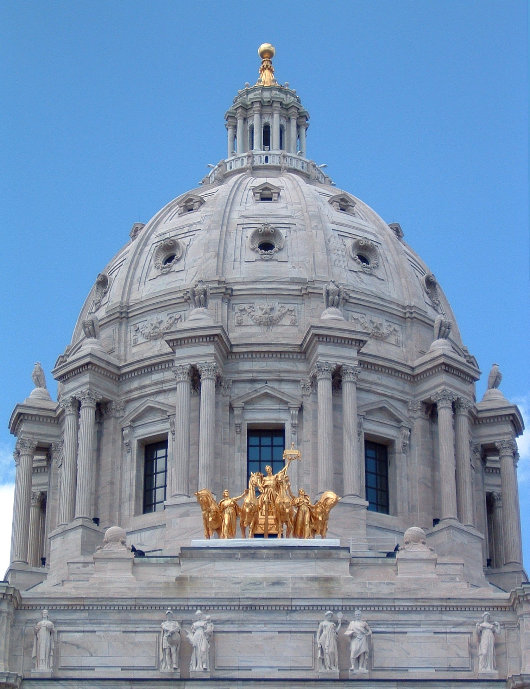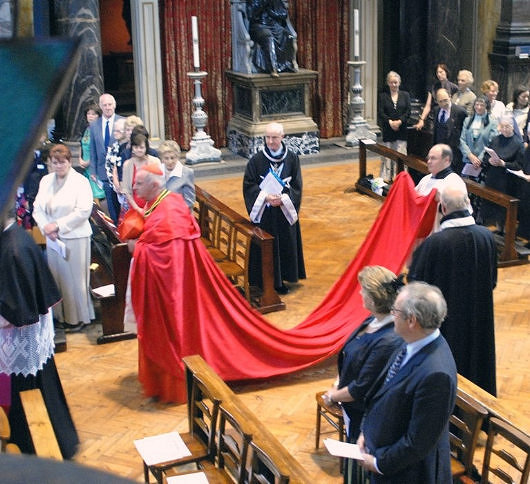2009 July
About Andrew Cusack
 Writer, web designer, etc.; born in New York; educated in Argentina, Scotland, and South Africa; now based in London.
Writer, web designer, etc.; born in New York; educated in Argentina, Scotland, and South Africa; now based in London. read more
News
Blogs
Reviews & Periodicals
Arts & Design
World
France
Mitteleuropa
Knickerbockers
Argentina
The Levant
Africa
Cape of Good Hope
Netherlands
Scandinavia
Québec
India
Muscovy
Germany
Academica
The Prime Minister of China who became a Benedictine Abbot

CHRISTIANITY HAS A LONG and varied history in China stretching over at least one-and-a-half millenia. The ancient country has even had Christian leaders, such as the Congregationalist founder of the Chinese Republic, Sun Yat-sen, and his Methodist successor, Gen. Chiang Kai-shek (head of the Kuomintang for nearly forty years). Still, until I read this fascinating story in the Catholic Herald I had no idea that there was a Prime Minister of China, Lou Tseng-tsiang (陸徵祥), who ended his days as a Benedictine monk by the name of Dom Pierre-Célestin. Lou was born a Protestant in Shanghai in 1871, but married a Belgian woman and eventually converted to Catholicism. Serving his country in the diplomatic arena, he accomplished extensive reforms of the Ministry of Foreign Affairs, avoided becoming part of any of the various factions that divided the government, and was one of the founding members of the Chinese Society of International Law. Lou bravely stood up to the indignities imposed upon China through the 1919 Treaty of Versailles by refusing to sign the shameful document which sewed the seeds of future disaster.
Xu Jingcheng, Lou’s mentor and sometime Ambassador to the Court of the Tsars in St. Petersburg, instructed the up-and-coming diplomat that “Europe’s strength is found not in her armaments, nor in her knowledge — it is found in her religion. … Observe the Christian faith. When you have grasped its heart and its strength, take them and give them to China.”
After the death of his wife, Lou became a Benedictine monk at the abbey of Sint-Andries in Flanders, and was eventually ordained a priest in 1935. A decade later, Pope Pius XII — who cared deeply for the Church in China and finally settled the long-standing dispute over Chinese ancestor-honouring rituals in favour of the practices — appointed him titular abbot of the Abbey of St. Peter in Ghent. Sadly, the Chinese Civil War prevented Dom Pierre-Célestin from returning to China, and he died in Flanders in 1949.
The words of Lou’s mentor that Europe’s strength is her faith found recent confirmation from Professor Zhao Xiao, a prominent Chinese economist at the University of Science & Technology Beijing. Prof. Zhao, a member of the Chinese Communist Party, began studying the differences between the economies of Christian societies and those of non-Christian societies. As a result of his investigations, he argued that Christianity would provide a “common moral foundation” for China that would help the economy by reducing corruption, narrowing the gap between rich and poor, preventing pollution, and promoting philanthropy.
“A good business ethic or business morality,” Prof. Zhao says, “can provide for a type of motivation that transcends profit seeking. Why do people want to do business? The main goal would be to earn money. The purpose of a company is to maximize profits. But this can cause companies to look for quick results and nearsighted benefits. It can cause companies to disregard the means and earn money at the expense of destroying the environment, society and the livelihood of others, or endangering the entire competitive environment of the trade.”
“If my motivation for doing business is the glory of God, there is a motivation that transcends profits. I cannot go and use evil methods. If I used some evil methods to enlarge the company, to earn money, then this is not bringing glory to God. Therefore, this is to say that it [bringing glory to God] can provide a transcendent motivation for business. And this kind of transcendental motivation not only benefits an entrepreneur by making his business conduct proper but it can also benefit the entrepreneur’s continued innovation.” (more…)
Heaven in Herefordshire
In the weekly South African edition of the Telegraph, I came across a brief note marking the death of England’s oldest publican, Flossie Lane of ancient Leintwardine in Herefordshire. From the internet, I find the full version of her obituary, which is reproduced below. The Sun Inn, with its “Aldermen of the Red-Brick Bar” sounds like a splendid haven.
Flossie Lane, who died on June 13 aged 94, was reputedly the oldest publican in Britain, and ran one of the last genuine country inns
For 74 years she had kept the tiny Sun Inn, the pub where she was born in the pre-Roman village of Leintwardine on the Shropshire-Herefordshire border.
As the area’s last remaining parlour pub, and one of only a handful left in Britain, the Sun is as resolutely old-fashioned and unreconstructed today as it was in the mid-1930s when she and her brother took it over.
According to beer connoisseurs, Flossie Lane’s parlour pub is one of the last five remaining “Classic Pubs” in England, listed by English Heritage for its historical interest, and the only one with five stars, awarded by the Classic Basic Unspoilt Pubs of Great Britain.
She held a licence to sell only beer – there was no hard liquor – and was only recently persuaded to serve wine as a gesture towards modern drinking habits.
With its wooden trestle tables, pictures of whiskery past locals on the walls, alcoves and a roaring open fire, the Sun is listed in the CAMRA Good Beer Guide as “a pub of outstanding national interest”. Although acclaimed as “a proper pub”, it is actually Flossie Lane’s 18th-century vernacular stone cottage, tucked away in a side road opposite the village fire station.
There is no conventional bar, and no counter. Customers sit on hard wooden benches in her unadorned quarry-tiled front room. Beer – formerly Ansell’s, latterly Hobson’s Best at £2 a pint – is served from barrels on Flossie Lane’s kitchen floor. (more…)
A humble house in Buenos Aires

Landowner Ignacio Pirovano rests in his family’s Buenos Aires townhouse, 1964.
L’etoile du Nord

The dome of the Minnesota State Capitol, one of the finest government buildings in the New World.
Homage to Jean Seberg
 One of the earnest stalwarts of the blog was wandering around the Metropolitan recently when he came upon this curious “multi-media art work” by Barbara Bloom entitled Homage to Seberg. Bloom is a photographer, designer, and “installation artist” who was the subject of her own show at the International Center of Photography last year. This work was created in 1981 and forms part of the temporary exhibition “The Pictures Generation” at the Metropolitan Museum of Art.
One of the earnest stalwarts of the blog was wandering around the Metropolitan recently when he came upon this curious “multi-media art work” by Barbara Bloom entitled Homage to Seberg. Bloom is a photographer, designer, and “installation artist” who was the subject of her own show at the International Center of Photography last year. This work was created in 1981 and forms part of the temporary exhibition “The Pictures Generation” at the Metropolitan Museum of Art.
The installation includes a copy of the Herald Tribune, the newspaper sold by Jean Seberg’s character in the 1960 Godard film À bout de souffle, resting one of the butterfly chairs so popular during the 1960s. Readers will remember Jean Seberg & the Trib from our post on the continued decline of the International Herald Tribune and the follow-up from the Guardian‘s media blog.
What I didn’t know was that Ms. Seberg was American, Iowa-born, and a supporter of the Black Panthers. Sadly, she died in Paris in 1979 of an overdose of barbiturates and alcohol in an incident the French authorities ruled a probable suicide. (more…)
Lord Clark
This clip of Kenneth McKenzie Clark, Baron Clark, OM, CH, KCB, FBA is from the end of his BBC documentary series Civilisation. Here Lord Clark complains about the lack of a true center, as he then could see none. Thankfully, Lord Clark found that center shortly before the end of his life, and was received into the Catholic Church.
“The great achievement of the Catholic Church,” said Lord Clark in Civilisation, “lay in harmonizing, civilising the deepest impulses of ordinary, ignorant people.”
Our Cardinal at the Oratory

His Eminence Keith Patrick O’Brien, Cardinal Archbishop of St Andrews & Edinburgh, at the Brompton Oratory for the Feast of St. John the Baptist this year.
(From the NLM)
First Things, Three Songs

Through an interesting post by Joseph Bottum on the First Things blog, I discover that R. R. Reno posted all three of the songs I elaborated upon in my June 2007 post “We’ve Lost More Than We’ll Ever Know”, though (so far as I can tell) he arrived at the same three without stumbling across my entry on them. I always read First Things in New York (it’s one of my favourites, and simply a must-read), but it’s sadly not available in South Africa (bar actually scraping one’s pennies together for a subscription) so I’ll just have to wade through friends’ archives when I return to the Empire State. (Or does the Society Library have a subscription? And if not, why not?).
While it has a reputation among some Catholics as being a bit too liberal & democratist, I suspect the whiff of Americanism one finds in the pages of First Things is akin to the aroma of tobacco in an old bar: the smell lingers but that doesn’t mean anyone’s actually still smoking. Nonetheless, they often feature top-notch articles and writing that are of interest to Catholics & other traditionalists.
Of tribes and traditions
In tribal Africa, Ghaddafi expounds traditional government; Meanwhile ethnic Romanians vote to be ruled by their German neighbours.

«Ghaddafi dreams of kings, princes, sultans, sheiks»
reports the Afrikaans newspaper Die Burger.
ONE OF THE LESS-REPORTED aspects of the selection of Col. Moammar al-Ghaddafi, the tent-dwelling Libyan leader and notorious eccentric, as Chairman of the African Union was his proposal that an upper house of “kings, princes, sultans, sheiks, and other traditional leaders” be added to the Pan-African Parliament. Col. Ghaddafi has been forthright in his condemnation of democracy as ill-suited to the African continent. “We don’t have any political structures [in Africa], our structures are social,” he explained to the press. Africa is essentially tribal, the argument goes, and as such multi-party democracy always develops along tribal lines, which eventually leads to tribal conflict and warfare. “That is what has led to bloodshed,” the AU chairman posited, citing the recent example of the Kenyan elections.
Europe, of course, solved the matter of tribal difficulties by brutally uprooting long-established peoples from their native lands after the Second World War and transferring them to jurisdictions in which they would ostensibly be part, not only of the majority, but of theoretically “national” states. Cities with centuries of Polish history became Soviet, towns as German as sauerkraut became Polish, and so on and so forth. Sometimes the undesired populations of multi-ethnic places were cruelly murdered, as recent revelations from the police in Bohemia have shown.
Still, remnants of the old cosmopolitan order remain. (more…)
Quebec Stamp

This stamp was designed by Jorge Peral, the artistic director of the Canadian Bank Note Company, for Canada Post to commemorate the four-hundredth anniversary of the foundation of Quebec.
Search
Instagram: @andcusack
Click here for my Instagram photos.Most Recent Posts
- Silver Jubilee November 21, 2024
- Articles of Note: 11 November 2024 November 11, 2024
- Why do you read? November 5, 2024
- India November 4, 2024
- The Lithe Efficiency of the Old Constitution November 4, 2024
Most Recent Comments
Book Wishlist
Monthly Archives
Categories


